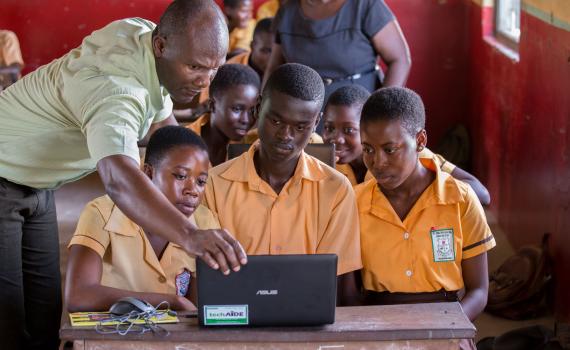Introduction
The provision of education has moved beyond the traditional classroom face-to-face session to online learning (synchronous or asynchronous) in several developed countries. As Ghana could not, over the years, move with the digital tide, the ravaging effect of the Covid-19 pandemic on education has left us with no option than to, with open arms, embrace online teaching and learning.
It is as a result of enhancing online learning and the massive pursuance of the digitalization agenda that the government of Ghana have agreed to supply all teachers at the pre tertiary education levels with laptop computers to enhance teaching and learning. Having been inundated with rumours on various social media platforms on the distribution of laptops to pre tertiary teachers, the air has finally been cleared by the Director General of the Ghana Education Service (GES), Prof. Kwasi Opoku Amankwa.
In the letter addressed to the three teacher unions, NAGRAT, GNAT and CCT-GH dated 29th January, 2021, the GES confirmed the imminent distribution of the laptops to teachers. Uploaded onto the laptops are professional materials such as the curriculum, teachers resource packs, Continuous Professional Development (CPD) and Professional Learning Communities (PLC) modules and textbooks on core subjects.
In response, all the three teacher unions have expressed their excitement and consented to the initiative especially as government has agreed to absorb 70% of the total cost while the teacher pays the remaining 30%. It is very necessary for teachers to have raised red flag on the total mysterious cost of each laptop which seem to be conspicuously missing in both letters of the GES and the teacher unions.
Teachers’ oppositionA section of teachers who are opposed to the 30% cost to be paid by teachers believe that the laptops should be freely distributed to them. According to them, the computers and iPads installed at the Directors of Education and Member of Parliament’s offices respectively were not partly paid for by the users hence teachers should likewise not pay a dime.
These group of teachers further believe that since doctors and nurses do not partly pay for their medical equipment, then what is good for the goose must be good for the gander.
In the above arguments, the opposers of this project surprisingly forgot that the iPads at the MPs’ offices, computers at the Directors’ offices and the medical equipment uses by the doctors and nurses are not owned by these professionals. In other words, they have no right to take these items away from their offices and must be left in times of transfers or retirement.
Why teachers must support the project
The 30% payment to be made by teachers hands them the right to own the laptops. Teachers can take them away even when they retire or eventually get transferred. It is instructive to note that no professional in Ghana has been supplied laptops free of charge. This move by the teacher unions to lobby for this project from the Ministry of Education and the Ghana Education Service is a real bargain that needs to be commended but not condemned.
Another very important reason why teachers must really behind this laptop project is to end the pen-and-paper writing of lesson notes. The writing of lesson notes into notebooks, apart from being stressful, is a time consuming activity which eats up precious time of teachers which could have been used for other researches.
With the curriculum materials already installed onto the laptops, the suggested lesson notes prepared by NaCCA can be downloaded onto the laptops and used to end the burdensome task of writing lesson notes into notebooks. This would perfectly be in tandem with the fifth skill and competence under the new standards-based curriculum; the promotion of digital literacy.
The laptops would also help in the field of assessment. The filling of School Based Assessment, report cards, cumulative records and the building of learners’ individual portfolios would become easier if each teacher owns a laptop. This is also in agreement with the one of the core features of the Standards-based curriculum; the use of ICT as a tool for learning and assessment (NaCCA, 2019- Teachers Resource Pack page 12).
Finally, for learners in schools where there are no computers, this becomes a welcome initiative as teachers may sporadically take their laptops to class for practical lessons if the need arises. This will promote the teaching and learning of ICT even in the remotest of schools in Ghana.
Conclusion
The pouring of cold water on the “one teacher one laptop” project must stop and all pre-tertiary must embrace the project to improve upon our professional practice as far as pre-tertiary education is concerned.
Credit: Joseph Amofah












































